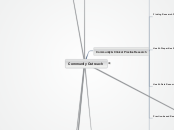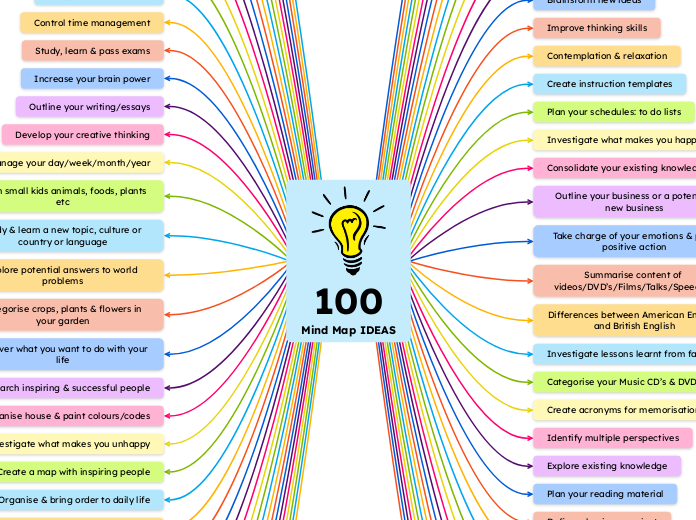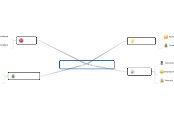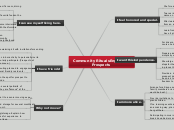Community Outreach
Minutes from first meeting:
-- Bob Greenlee, director, Marshfield Clinic Community Engagement & Research: How narrowly are we defining community? Is it a geographic, cultural, or provider definition — or all of those?
-- Chris Sorkness, sr. associate ICTR executive director with community program oversight: What about publicizing community-engaged research initiatives and best practices? What about highlighting successes for Type 2 pilot awards?
-- Barb Bowers, T2 education associate director with CAP: There is confusion in finding things with the current wording on the web. People ask: how do I find research information that helps me in my community? How can I access this? Why should I think about research? We should target new research partners.
-- Terry Cohn, community health connections: There needs to be a non-academic feeling and wording, so people in clinical settings in the state will connect.
-- Sarah/Brenda (CCHE): the term underserved is not clear or inclusive (in the blue box). Something like Minority Health might be better.
-- Another comment: perhaps "Community-based Investigators" might be a helpful entry in the FOR COMMUNITY MEMBERS box.
Assignment:
1) your choice for the one-line term that should be the title of that ICTR Web community blue box (currently "For Community Members")
2) a list of ICTR services and resources for community partners and community-based investigators that you each provide, that we want audiences to easily find on our web
Summary Responses:
1) your choice for the one-line term that should be the title of that ICTR Web community blue box (currently "For Community Members")
Community Engagement in Research’ and then have a second layer within this topic which allows people to choose between something like ‘For researchers’ and ‘For community partners’
Community Resources and Services
For Community Members
Community Engagement in Research
I don't have a preference for different term for the 'blue box' –CCHE/Sarah
2) a list of ICTR services and resources for community partners and community-based investigators that you each provide, that we want audiences to easily find on our web
• Defined patient populations for type 2 translational research
• Resources to facilitate engaging communities (note: defined broadly) in research
We first needs to really establish the purpose of the website, then determine how the contents should be arranged.
• It would be good to include an introduction about the importance of community-academic research partnerships to finding solutions to community health problems—with an explanation of the crucial role community partners play in the process.
• The content should be determined by the goal of the web space. If the goal is to find a place to put ICTR products, everybody at the 1/23/13 meeting needs to know that.
• If the goal is to support community partners, then the following feedback might be helpful. It was collected in December 2012 from eleven past, present and prospective community partners.
CCHE services in below list should be reflected as links.
CAP primary "audience" is made up more of faculty than non-academic health center investigators. If a community member was interested in getting involved in research and heard about ICTR and in particular, ICTR T2 funding, I would primarily want them to have access to a consult form so that I personally could connect with them and act as liaison to whatever they might need within ICTR -- rather than have them search for something on their own on the site.
Individual responses from above assignments
Bob Greenlee- MCRF
1. With admitted naiveté as to the potential impact on the rest of the web site and orderly web development principles, I’d vote for calling the box ‘Community Engagement in Research’ and then have a second layer within this topic which allows people to choose between something like ‘For researchers’ and ‘For community partners’. Each one would lead to its own front page that clearly describes what we think that group is, and what sorts of things they are going to be able to link to, so that if they think made the wrong choice they can go to the other one.
2. The 2 relevant ICTR services/resources (or at least the 2 main categories of such) that I’d plan to mention on the web for the MCRF CAP core would be:
a. Defined patient populations for type 2 translational research
b. Resources to facilitate engaging communities (note: defined broadly) in research
(But I should probably reserve the right to change my mind on how to organize this after I hear the good ideas that come from the other participants in the meeting.)
Terry Cohn WREN
Our suggestion for the box is "Community Resources and Services".
I don’t mean to be trying to get out of our current assignment, or to be contrary, but do feel that in order to do a good job on navigation and content; one first needs to really establish the purpose of the website.
I did some searching on the internet for a good list of reasons to have a website, and propose the following list from the business perspective for us to consider. I believe the model works for whatever “business”.
• To establish an internet presence
• It is an extension of your current advertising
• To enhance your professional image/corporate identity
• To offer company information and give the public a favourable impression
• To educate customers and potential customers on products and services offered by you
• To provide better customer service by providing information and feedback mechanisms
• To increase public awareness of the your company’s name, brand or identity
• To strengthen your position in the marketplace.
• Create an internet footprint for you
• To strengthen brand identification
• To develop a list of qualified prospects and leads
• It can sell products directly over the Internet taking credit cards and checks (e-commerce)
• To make product or service information available to current customers
• To make product or service information available to distributors
• To bring in new clients or customers to our location via contact and map information
• To compete in the global marketplace
• To offer links to other relevant sites
• To offer a virtual community, a place where users can interact with each other
• To form a basis or platform for social media sharing
• Keep clients and distributors informed on success stories/testimonials and industry related news
http://www.abc.co.za/the-purpose-of-a-website/
A website is static. One invites people to visit it from other social media sites such as twitter and facebook or blogs. One can have live facebook and twitter feeds on their website that are fed by social media widgets. That keeps one's website alive and provides notifications of upcoming events.
So, if there already exists a document with the purpose of the website, it would be helpful to share it. If not, I would think one needs to be developed because those of us who met may have different desires, as identified in the list above when envisioning why one would visit the website.
Sharon Schuumacher
1. One-line term that should be the title of that community blue box (currently "For Community Members")
“For Community Members”
2. A list of ICTR services and resources for community partners and community-based investigators that you each provide, that we want audiences to easily find on our web.
• It would be good to include an introduction about the importance of community-academic research partnerships to finding solutions to community health problems—with an explanation of the crucial role community partners play in the process.
• The content should be determined by the goal of the web space. If the goal is to find a place to put ICTR products, everybody at the 1/23/13 meeting needs to know that.
• If the goal is to support community partners, then the following feedback might be helpful. It was collected in December 2012 from eleven past, present and prospective community partners.
Q: Which of the following information would be—or would have been—useful to you in your experience as a research partner and community health stakeholder? Please check all that apply.
# of times checked
Funding and partnership opportunities. 5
A way to communicate online with other communities and researchers. Comment: We have had other agencies have interest but due to distance and regional constraints unable to find ways to learn as much about others with similar actions. 4
How to find research-tested health and prevention program models. 4
Examples of existing partnerships around the state. 3
Tips for developing competitive grant proposals. 3
Best methods for evaluating community health programs. 3
Provide tips for deciding whether to enter into a research partnership. 2
A check list for how to negotiate a research partnership that benefits my community. 2
Tips for partnering with university-based researchers. 2
Other. Please describe. Contact information. 1
Q: Please open the web page at this URL. (You'll have to paste the URL into your browser window.) Then, open the link for each topic on the page and read to decide whether the information would be useful to you as a community-based research partner. Then rate below how likely you would be to use the information in each topic.
I would not
use this information Not sure I would likely
use this information I would be extremely likely to use this information
Finding Collaborators 4
Health Equities / Underserved 2 1 1
Statewide Networks 1 3
Working with Policy Makers 4
Learning Opportunities 1 2
CCHE/Sarah E’s comments
I don't have a preference for different term for the 'blue box' –
Questions 2) needs to reflect/links to include our services.
Service provided
Orientation to CCHE Mission and CCHE/ICTR health equity research resources
Conducting a Mock Review for a Health Equity investigator/scholar submitting to NIH
Securing a CCHE Letter of Support for a research grant proposal application
Assistance with developing a research Memorandum of Understanding with a community partner
Community engaged health equity research evaluation services
Request for co-sponsorship of an event (lectures, conference, etc.)
Exploring partnership with a community based organization to conduct research collaboratively
Exploring a partnership with a CBO to advance health equity research infrastructure/capacity
Arranging a community advisory board review of/feedback about my research
Guidance on a Wisconsin Partnership Program grant application
Review of grant idea with community engaged health equity research elements
Review of health equity focused NIH research grant proposal in draft form
Review/feedback on a health equity/community engaged research publications in development
Advising on successful recruitment strategies to engage members of underrepresented communities
Utilizing a Research Ambassador for limited research study/support/coordination
Assisting with development of IRB protocol for community engaged health equity research
Assisting with responding to IRB Request for Modifications
Andrea Dearlove – CAP
1. For the blue box title, still: "Community Engagement in Research" or "Engaging Wisconsin's Communities in Research"; p.s., i love the UNC site: http://tracs.unc.edu/
2. In my position within ICTR, my primary "audience" is made up more of faculty than non-academic health center investigators. If a community member was interested in getting involved in research and heard about ICTR and in particular, ICTR T2 funding, I would primarily want them to have access to a consult form so that I personally could connect with them and act as liaison to whatever they might need within ICTR -- rather than have them search for something on their own on the site.
List of services for investigators -- these can be directed to either academic investigators or community members/stakeholders:
Facilitating initial connections
Ongoing support for research collaboration
Providing access to community/stakeholder advisory boards for research feedback (mostly for academic investigators)
Collaboration with a practice-based or community-based research network
Building skills/education offerings/workshops
Generating research questions/discussing project ideas
Career mentoring (for academic investigators)
Study design
Project implementation
Data analysis
Regulatory support
Preparing a grant./contract submission
Preparing a scientific manuscript/poster/oral presentation
Promoting or distributing written materials on a specific topic with a community audience
Promoting or coordinating oral presentations or briefings on a specific topic with a community audience
Providing assistance on specific policy improvement activities and/or policy decisions
Providing assistance on specific program and practice improvement activities
UNC home page:
Main topic
Community & Clinical Practice Research
Health Policy & Dissemination
La Follette Health Policy Assistantships
Evidence-based Health Policy Project
Practice-based Research Networks
WON
Pharmacy Network
under development
http://www.fammed.wisc.edu/research/wren
Health Data Resources
Links to applicable Marshfield Clinic sites
PMRP - Personalized Medicine Research Project
Study of the Health of Wisconsin
Marshfield Epidemiologic Study Area
Health Disparities Research
Includes welcome and description for both community members and investigators/researchers
Great Lakes Inter-Tribal Council
United Community Centers
Center for Urban Population Health
http://www.cuph.org/
Collaborative Center for Health Equity
For investigators
For minority community members
Provide proper tags to this page so that it appears readily in search engines. (Same for all other pages, of course.)
Finding Research Partners
Marshfield
See Humberto V. column in last ICTR newsletter
CAP Consults
Resources for Research Projects
Sonderegger Research Center
Qualitative Research Resource
Office of Continuing Professional Development - Research Unit
Health Innovation Program
http://www.hip.wisc.edu/
Marshfield Clinic
Education
Community-Academic Partnerships
CRU
Clinical Research Unit
WiNHR
CRIS
OnCore
They have an investigator knowledge base for OnCore. So this educational component for Oncore could/or not be added to the educational tools list.
CCHE
Data captains: Sarah Esmond & Megan Larson
Data source: CCHE spreadsheets, CCHE employees
Reporting spreadsheet finalized:
"Title" and "Affiliation" in Project Personnel will be retrieved from ICTR membership database.
Services Provided are still being defined as of 8/23.
Grant info will only be reported (available) for HELI scholars that have a continued service relationship with CCHE.
CAP
Data captain: Heather McManamy
Data source: Access database maintained by Heather
8/31/12 - A new project-oriented database is currently being developed, based on existing Health Innovations Program database (with help from Patrick Ferguson at HIP)
For Sept. 7 reporting, CAP will submit only HIP service data (March-July). HIP report contatins the greatest amount of service data from CAP.
For Oct. report, CAP will submit only Type II pilot grant data (March-Sept)
For Nov. report, CAP will submit data from all remaining areas, including HIP and Type II grant updates (March-Oct)
CAP uses different grant type definitions - these will need to be reviewed and "mapped" to WebCAMP grant type categories when the data arrives (on spreadsheet)
Sub-components of CAP will be included in the Core/Component name field - we will need to separate that text and add the sub-component description to the "Service details" text.
OCPD
Office of Continuing Professional Development (OCPD)
CAP Education
CAP Front Door
I don't know what this is?
Simulation Center
HIP
Health Innovation Program (HIP)
LaFollette Institute
SEIPS
Systems Engineering Initiative for Patient Safety
Evidence Based Health Policy Project
Sonderegger
WREN
Wisconsin Research & Education Network
CHC
Community Health Connections
REC
ICTR offers a wide array of educational, training and career development opportunities for post-doctoral fellows, junior faculty or students in the Schools of Medicine and Public Health, Nursing, Pharmacy, Veterinary Medicine and the College of Engineering, as well as other health science professionals who are interested in learning more about clinical and translational research. The overall aim of ICTR's educational offerings is to develop a diverse, multidisciplinary clinical and translational research workforce in order to accelerate the translation of research findings into evidence-based policies and practices that improve the health of all populations in the United State
Education & Training
Community Resources
Explore Marshfield resources to include in this section
Grant writing resources
Fundamentals of Effective Grant Writing
link to video presentation on IME library
Wisconsin Partnership Fund web site
Program development and evaluation
Education and Training Resources for Community Research Partners
Cooperative Extention's Web Site on Program Development and Evaluation
Links to health research/community partnerships information
Associations, etc.
Links to American Diabetes Association
The University of Wisconsin-Madison Speakers Bureau
Transforming Campus Communittees through Public Engagement:The Critical Role of Boundary Spanners
Community-Campus Partnerships for Health (CCPH)
IME video library
Outreach @ Ebling Library
Research Training Resources
Includes resources for both clinical and translational...change to "Investigator Resources?"
roll-over displays "Type 1/ Type 2 Clinical"
Include the videos and bibliographical resources currently included on the CAP Education page:
Qualitative Methods video
Collaborative Conversations video
Comm-based Participatory Research Methods video
Type 2 trans. research bibliog.
Qualitative research bibliog.
Include both Madison and Marshfield offerings in each of these areas
ICTR Research Learning Series videos featured under each of the applicable topic areas (from both Madison & Marshfield)
These areas include links to offerings from the Graduate School (vs. a separate link to Grad School training page)
Mentor development program
Regulatory Training
Links to Training under For the Investigator-->Regulatory Resources
Coordinator Training
National Organizations for Coordinators
Such as SOCRA
CITI
Mid-state Technical College (Marshfield)
Link to info on Associate Degree in Research Coordination
Bioethics and Regulations
Bioethics and Application of Regulations to Research
Professionalism and Collaboration Skills
Project Management
Manuscript Writing
Biostatistics for projects
Teaching and Presentation Skills
Study Design and Methodology
Grant Writing
Pre- and Post-doc Funded Training
Page includes overview of this area
Each section under this area includes application information
Post-doc training
AHANA Diversity program (CCHE)
KL2 Scholars Program
Training activities
Mock study sessions
Writing groups
Events schedule (contained in master calendar)
Past Scholars
Current Scholars
Pre-doc training
Summer research programs
Nursing, Pharmacy, Vet Medicine, Engineering (future)
Undergrad Minority/Diversity program
p
TL1 Program
TL1 Trainees
Graduate & Certificate Programs
Partner Programs
School of Vet Med
College of Engineering
School of Nursing
School of Pharmacy
SMPH
ICTR Certificates in Clinical & Translational Research
Type 2 Translational Research certificate
Capstone Certificate in the Fundamentals of Clin. Research
Certification Admission Requirements and Application Process
Certificate Course Requirements and Descriptions
ICTR Graduate Programs in Clinical Investigation
Add links to PDF versions of student and faculty handbooks
Faculty Mentors
GPCI Faculty Governance Committee
PhD Minor in Clinical Investigation
PhD in Clinical Investigation (major)
MS in Clinical Investigation
Admissions Guidelines
Application Guidelines
Learning Objectives and Curriculum
Overview of Clin. Investigation Program









